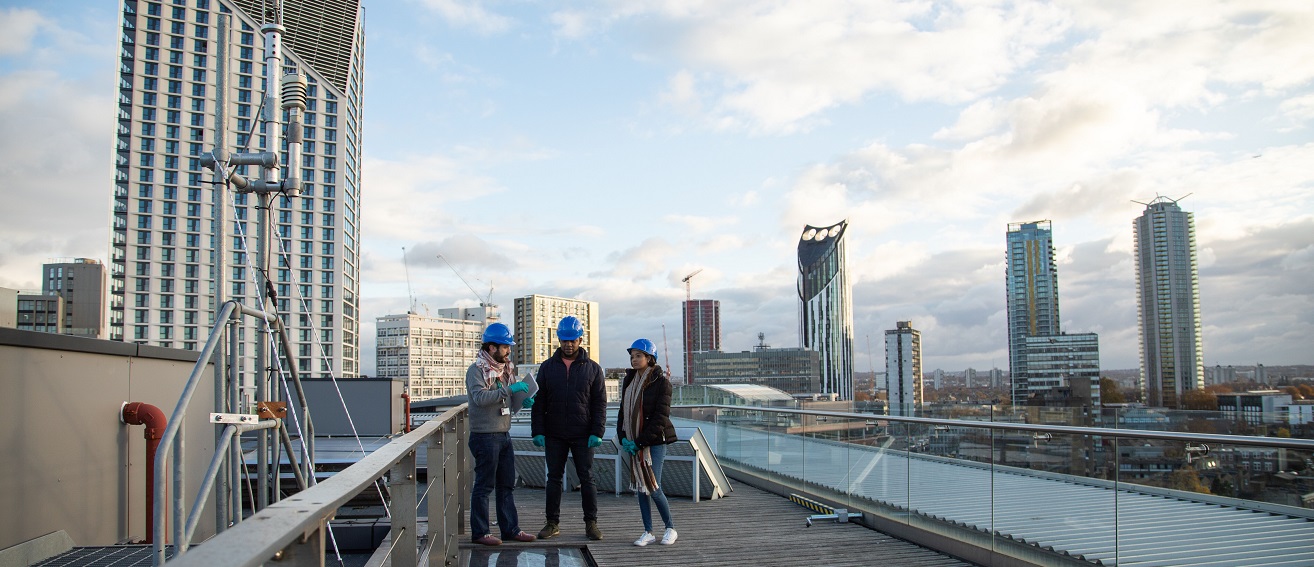Overview
Design, build and maintain things that can and do change the world as a civil engineer. Roads, bridges, canals, dams and buildings have all played an integral role in how the human race has developed. Civil Engineering is a broad area with a number of exciting different specialisms, and you can prepare for any of them with our programme.
Accredited by the Engineering Council, this course is the first step to becoming a qualified Chartered Civil Engineer. It’s offered on a full-time, sandwich, and part-time basis.
Are you looking to study BEng Civil Engineering, but don’t have the traditional requirements? Our HNC Civil Engineering provides an excellent first step for those with a National Certificate or Level 3 in related topics. Passing this helps you progress onto BEng Civil Engineering.
Why Civil Engineering at LSBU?
- random
- Joint 4th in London for student satisfaction in Civil Engineering (Complete University Guide Subject League Tables 2024).
- power-off
- High earning potential - our Architecture, Building and Planning graduates have a median graduate salary of £33,700 - the second highest graduate salary for this subject area in the UK (2022 LEO Data).
- puzzle piece
- 95% of students on this programme said the course was intellectually stimulating and 93% said the course challenges them to achieve their best work (National Student Survey 2023).
- fa fa-users
- Study in a central London £4bn regeneration area and take part in a wealth of site visits, field trips and tours organised by our industry partners.
- fa fa-users
- Decades of accreditation by the Engineering Council, carried out by the Joint Board of Moderators, as fully satisfying the educational base for an Incorporated Engineer (IEng).
| ModeFull-time | Duration3 or 4 years (4 year option includes work placement) | Start dateSeptember | Application codeH200 | Application method UCAS |
| ModePart-time | Duration5 years | Start dateSeptember | Application code5383 | Application method Direct to LSBU |
Location
London South Bank University student union is located at 103 Borough Rd, London SE1 0AA.
If you are visiting our Southwark Campus, you may wish to use our downloadable campus map (PNG File 466 KB). For information on accessibility, see our DisabledGo access guides. See our location page for more details.
Entry Level Requirements
- A Level BBC - Must include Mathematics and preferably a Science in either Chemistry or Physics (UCAS points: 112)
- T-level (Merit or above) in Construction: Design, Surveying And Planning. (UCAS points: 120)
- BTEC Level 3 Extended Diploma DDM in an Engineering subject area, with a minimum of merit in Mathematics and Further Mathematics. (UCAS
- points: 128)
- BTEC Level 3 National Diploma D*D* in an Engineering subject area, with a minimum of merit in Mathematics and Further Mathematics. (UCAS points: 112)
- Civil Engineering Technician level 3 apprenticeship DD (UCAS points: 96) alongside grade Pass or Distinction at EPA
- If you have any of the above qualifications but don't meet the criteria, or any other technical qualifications awarded with UCAS points at a similar level, please get in contact with the LSBU Apprenticeships at apprenticeships@lsbu.ac.uk for Apprenticeships Routes.
- Applicants must hold 5 GCSEs A-C including Maths and English or equivalent (reformed GCSEs grade 4 or above).
Our employer pages provide information about who can be an apprentice, the steps to offering an apprenticeship and the employer commitment.
Choose your country
Select country here:
Missing English and Maths qualifications?
If you do not have the required English and Maths qualifications needed to satisfy the entry requirements for this programme, we have courses available at our partner College that you can take to upskill in these areas. Find out more at South Bank College.
Advanced entry
If you have already completed some studies at another university, we may be able to consider you for advanced entry. Please see our advanced entry page for more information.
United Kingdom
£9250
Tuition fees for home students
International
£14900
Tuition fees for international students
Tuition fees are subject to annual inflationary increases. Find out more about tuition fees for Undergraduate or Postgraduate courses.
-
Part-time
part-time
BEng (Hons) Civil Engineering (PT) - Year 1
UK fee: £5550 International fee: £8940 AOS/LSBU code: 5383 Session code: 1PS00 Total course fee: UK: £27750 International: £44700 BEng (Hons) Civil Engineering (PT) - Year 2
UK fee: £5550 International fee: £8940 AOS/LSBU code: 5383 Session code: 2PS00 Total course fee: UK: £27750 International: £44700 BEng (Hons) Civil Engineering (PT) - Year 3
UK fee: £5550 International fee: £8940 AOS/LSBU code: 5383 Session code: 3PS00 Total course fee: UK: £27750 International: £44700 BEng (Hons) Civil Engineering (PT) - Year 4
UK fee: £5550 International fee: £8940 AOS/LSBU code: 5383 Session code: 4PS00 Total course fee: UK: £27750 International: £44700 BEng (Hons) Civil Engineering (PT) - Year 5
UK fee: £5550 International fee: £8940 AOS/LSBU code: 5383 Session code: 5PS00 Total course fee: UK: £27750 International: £44700 -
Full-time
full-time
BEng (Hons) Civil Engineering (FT) - Year 1
UK fee: £9250 International fee: £14900 AOS/LSBU code: 191 Session code: 1FS00 Total course fee: UK (excluding any optional years): £27750 UK (including any optional years): £27750 International (excluding any optional years): £44700 International (including any optional years): £44700 BEng (Hons) Civil Engineering (FT) - Year 2
UK fee: £9250 International fee: £14900 AOS/LSBU code: 191 Session code: 2FS00 Total course fee: UK (excluding any optional years): £27750 UK (including any optional years): £27750 International (excluding any optional years): £44700 International (including any optional years): £44700 BEng (Hons) Civil Engineering (FT) - Year 3
UK fee: £0 International fee: £0 AOS/LSBU code: 191 Session code: 3FS00 Total course fee: UK (excluding any optional years): £27750 UK (including any optional years): £27750 International (excluding any optional years): £44700 International (including any optional years): £44700 BEng (Hons) Civil Engineering (FT) - Year 4
UK fee: £9250 International fee: £14900 AOS/LSBU code: 191 Session code: 4FS00 Total course fee: UK (excluding any optional years): £27750 UK (including any optional years): £27750 International (excluding any optional years): £44700 International (including any optional years): £44700
For more information, including how and when to pay, see our fees and funding section for undergraduate students.
Please check your fee status and whether you are considered a Home, EU or International student for fee-paying purposes and for our regulatory returns, by reading the UKCISA regulations.
See our Tuition Fees Regulations (PDF File 391 KB) and Refund Policy (PDF File 775 KB).
Possible fee changes
The University reserves the right to increase its fees in line with changes to legislation, regulation and any government guidance or decisions.
The fees for international students are reviewed annually and the University reserves the right to increase the tuition fees in line with the RPIX measure of inflation up to 4 per cent.
Scholarships
We offer several types of fee reduction through our scholarships and bursaries. Find the full list and other useful information on our scholarships page.
International students
The course is not currently open to international students.
International (non Home) applicants should follow our international how to apply guide.
Home
| Mode Full-time | Duration 3 or 4 years (4 year option includes work placement) | Start date September | Application code H200 | Application method UCAS |
| Mode Part-time | Duration 5 years | Start date September | Application code 5383 | Application method Direct to LSBU |
For full-time courses, please send your applications through the Universities and Colleges Admissions Service (UCAS) using our code L75. UCAS is the organisation responsible for managing applications to higher education courses in the UK.
For part-time courses, you can apply directly to the University.
For more details on how to apply (full-time and part-time) see our how to apply page.
Accommodation
Once we have made you an offer, you can apply for accommodation. You can rent from LSBU and you’ll deal directly with the university, not third party providers. That means we can guarantee you options to suit all budgets, with clear tenancy agreements and all-inclusive rents that include insurance for your personal belongings, internet access in each bedroom and on-site laundry facilities.
Or, if you’d rather rent privately, we can give you a list of landlords – just ask our Accommodation Service.
Read more about applying for accommodation at LSBU.
Finance
You don't need to wait for a confirmed place on a course to start applying for student finance. Read how to pay your fees as an undergraduate student.
Prepare to start
Applicant events
After you’ve received your offer we’ll send you emails about events we run to help you prepare for your course.
Enrolment
Before you start your course we’ll send you information on what you’ll need to do before you arrive and during your first few days on campus. You can read about the process on our Enrolment pages.
You'll study theory and practice relating to the many diverse areas of civil engineering.
Year 1
- Mathematics A
This module consolidates the mathematical skills that underpin all the BEng Civil engineering degrees. It is specifically designed to cater for the wide differences in the mathematical background of students to reach an equivalent A-Level Maths and then extend it by introducing the main mathematical techniques which are required in the early stages of Civil engineering degrees. Use of sketches, diagrams and software. Assessment methods: Coursework 1 (50%); Coursework 2 (50%). - Fluid mechanics A
This module teaches fundamental principles of fluid mechanics, and their practical applications. The student will be able to understand the fundamental principles of fluid mechanics relating to hydrostatic and hydrodynamic forces, sediment transport, measurement of pressure, coastal and flood engineering aligning with the climate emergency, air flow around structures and flow in simple pipes and open channels. The student will perform fluid flow laboratory tests, and workshops and prepare reports. Assessment methods: Coursework 1 (50%); Exam (50%) - Construction Practice C
To provide all construction industry students with the knowledge of the interrelationships between industry, professional bodies and education and understanding of key professional and research requirements. The skills will provide them with a roadmap for their professional careers and enable them to prepare for employment in the construction discipline. Assessment method: Coursework 1 (25%); Coursework 2 (25%); Coursework 3 (50%) - Structures and Construction Technology A
Fundamentals of statics and strength of materials are taught, and numerous work examples are done to reinforce understanding. The study of structural concepts is enhanced by placing them in the context of construction technology. Assessment methods: Coursework 1 (25%); Coursework 2 (25%); Exam (50%) - Engineering Surveying
The module introduces learners to the basic theories of Engineering Surveying. Concepts of three-dimensional geometry are taught and related to practical surveying exercises. Surveying equipment used includes tapes, levels, theodolites and total stations – plus modern technology such as GPS and Laser Scanners. Students learn how measurements are taken and booked then carry out relevant computations, including the assessment of error and the calculation of reduced levels, bearings, coordinates, volumes and curves and using software for topographic maps. The acquired knowledge is to carry out a field project in small groups. The project involves surveying an area to determine the position of features and generate three-dimensional data (northing, easting, and height) of the area to develop a topographic map and contour using software programs such as AutoCAD/ArcGIS, setting out the physical features from the topographic maps and evaluation of errors in positioning. Particular attention is given to Health, Safety, and Security during practical sessions in addition to the need for a quality management process/system in undertaking practical work. Assessment methods: Coursework 1 (50%); Coursework 2 (50%) - Materials and Geology
This module introduces students to the properties of a variety of engineering materials and their application within the construction industry. Students will gain an appreciation of materials behaviour and characteristics, as well as an understanding of the environmental and societal impact of issues related to materials used in construction. In addition, it introduces the students to engineering geology and geomaterials (rocks and soils). The delivery of the course content is through traditional lectures and laboratory experiments and there is also an emphasis on teaching in the field with site visits. Assessment methods: Coursework 1 (25%); Coursework 2 (25%); Exam (50%).
Year 2
- BIM and Design
In this module, students learn principles of Building Information Modelling and use software to design sustainable buildings. They appreciate the multitude of clients’ needs and ensure equality, diversity and inclusion are embedded in the design. Programming software is applied to improve and refine designs. A digital 3D model of a building is transferred to structural software and the results of its computer analysis are compared with hand calculations. Assessment method: Coursework 1 (50%); Coursework 2 (50%). - Design of Elements A
In this module, students learn to design steel and reinforced concrete structural elements and steel connections, in accordance with Eurocodes 2 and 3, in addition to determining loads in accordance with Eurocodes 0 and 1 and preparing technical drawings based on their designs. Assessment methods: Coursework 1 (30%); Coursework 2 (70%) - Advanced Mathematics
This module covers intermediate undergraduate engineering mathematics for the BEng degree in Civil Engineering. It provides an introduction to mathematical concepts and solution techniques applied in analytical approaches to engineering problems, such as matrix methods, ordinary differential equations, vectors, probability and statistics, and optimisation. It also provides an introduction to applying numerical computational techniques to solving such problems. Assessment methods: Coursework 1 (50%); Exam (50%) - Hydraulics
This module aims to teach the advanced technical principles of open channel structure and pipe systems introduced in the Level 4 module Fluid Mechanics A and applies them to practical engineering applications of analysis and design in open channel structures and pipe systems. The student will develop a greater understanding of design formulas and mathematical models to design open channel structures and pipe systems. The student will perform open channel flow laboratory tests and prepare a formal hydraulics laboratory report. Assessment methods: Coursework 1 (50%); Exam (50%). - Structures and Construction Management A
Structures: The analysis of indeterminate beams and frames is developed from the previous levels. Moment distribution, unit load, flexibility method, plastic theory, and computer-aided analysis are covered. Construction Management: Introducing CDM, Procurement methods and Project Management aspects and tools such as CPM. Assessment methods: Coursework 1 (25%); Coursework 2 (25%); Exam (50%). - Soil mechanics
This module introduces Soil Mechanics by Project Based Learning. The theory related to soil properties and their measurement and simple models which are used to describe soil and its behaviour are taught by application to solve engineering problems. Standard laboratory tests are carried out and the results are analysed to determine the soil properties derived from the results to be used in the students’ coursework. Assessment methods: Coursework (100%)
Year 3
- Optional placement year
Year 4
- Individual research project A
The Individual Research Project involves the individual investigation of a specific area of civil engineering or a closely related discipline. The project should be of a research and investigative nature. Assessment method: 100% coursework. - Structures and design A
In the first semester of this module, students enhance their proficiency in the methods and approaches required to design structures to a professional engineering standard, with due consideration given to design requirements, practicality, sustainability, and economy. In the second semester, students develop a deeper understanding of structural behaviour and responses to static and dynamics loads via a range of classical calculation methods that are founded upon the fundamentals of structural mechanics; students are introduced to advanced finite element analysis via comparisons with these classical methods. Assessment methods: 30% coursework, 70% exam. - Highways engineering A
This module covers highways and junctions classification, principles of traffic flow, traffic analysis, transport modelling and planning, transport safety, and junction design and analysis. Also covered are the highway geometrical design and the highway structural design, including design traffic loading and materials in addition to related environmental and sustainability issues. Assessment methods: 40% coursework, 60% exam. - Geotechnical engineering
This module shows how the soil mechanics theories introduced in Soil Mechanics are applied to the solution of several geotechnical analysis and design problems in combination with the knowledge and skill developed in Structural modules. You will be able to analyse and design slops, walls, foundations, dams, and other geotechnical structures. Moreover, you will be able to analyse the distribution of stresses in the soil mass and the consolidation process in clayey soils. Assessment methods: 30% coursework, 70% exam. - Environmental engineering and professional development
This module takes the principles of environmental engineering and applies them to practical applications of analysis and design. You'll be introduced to the principles of water quality, and basic water and wastewater treatment processes, and you'll consider sustainability issues. You'll develop an understanding of the surface hydrology, and apply these principles to the calculation of precipitation and unit hydrograph. You'll also learn basics of groundwater flow, and the problem of contamination in groundwater, air pollution and noise pollution. This module will provide you with the professional development, attributes and other requirements needed for a position of responsibility that will be achieved during the "Initial Professional Development" at the workplace. Assessment methods: 30% coursework, 70% exam. - Group design project A
This module is designed to involve you in the process of engineering project development, from planning to detailed design, working with a project team. Assessment method: 100% coursework.
Facilities
Civil Engineering students have full use of our Strength of Materials laboratory during your studies with us.
This state-of-the-art facility is capable of performing product qualification testing and aiding knowledge development for structural assemblies and structural and mechanical components.
Careers
Networking opportunities
We can help you develop contacts in SMEs and larger construction companies through our annual careers fair, and the feedback from students and industrial partners is always very positive. Our partners who attend the careers fair are actively recruiting graduates, and many of our students get job offers as a result.
There were a record of 60 industry attendees in 2023, including:
- Institute of Highway Engineers
- KFH
- Kilnbridge
- Knight Frank
- Laing O'Rourke
- Pegasus Group
- Savills.
Our industry partners also visit campus to meet with students and offer support with CV writing and interview technique.
LSBU Employability Service
We want to set you up for a successful career. During your studies – and for two years after you graduate – you’ll have access to our Employability Service, which includes:
- An online board where you can see a wide range of placements: part-time, full-time or voluntary. You can also drop in to see our Job Shop advisers, who are always available to help you take the next step in your search.
- Our Careers Gym offering group workshops on CVs, interview techniques and finding work experience, as well as regular presentations from employers across a range of sectors.
Our Student Enterprise team can also help you start your own business and develop valuable entrepreneurial skills.
Civil engineers deliver a vital service in ensuring the safe, well-resourced construction of a huge range of projects in the built and natural environment, from transport networks to Olympic stadia.
The careers opportunities available to graduates of civil engineering are very diverse, from working as an engineering technician, surveyor or inspector of construction, to employment as a drafter creating visual guidelines for construction teams.
Diversification into management, engineering research or professions that value a numerical degree such as accountancy or banking has also historically been a possibility. Wherever an economy is strong there is an increase in demand for professionally qualified civil engineers, so overseas travel is also a possibility.
Because civil engineering is such a broad area, there are lots of different specialisms to consider after graduating. Our degree gives you a solid foundation for entering any of them.
What to expect from your career
Regardless of what is being built, civil engineers typically undertake site surveys and feasibility studies, analysing the risks of a project and coming up with designs to meet the challenges. They work with engineers and scientists from a wide range of backgrounds, assembling the right team of contractors for the job and overseeing their work as the build begins. Additionally, they manage budgets and ensure that all relevant legal requirements of the new construction are met.
They provide progress reports to their clients and play a crucial central role throughout the project until the building is finished. At that point, a civil engineer often draws up and hands over protocols for the maintenance and servicing of the construction.
Typical salaries
Chartered Engineers have average earnings around £47,000, and experienced Civil Engineers can earn up to £60,000 per year according to the National Careers Service.
Graduate success stories
Recent graduates from this course have gone onto roles in structural, water, public health, transportation and geotechnical branches of the civil engineering and building industry, working for consultants, contractors and government authorities.
Continuing to postgraduate studies
If you graduate from this course, you will be able to apply for further study at postgraduate level, including for a place on our full-time or part-time MSc Civil Engineering or MSc Structural Engineering.
Graduates from this course are also accepted for a wide range of MSc research degrees in engineering and also for MBA programmes. The course is accredited and you can gain Chartered Engineer status through further accredited learning at postgraduate level.
Civil engineering courses have been taught at LSBU for several decades and our alumni occupy senior positions throughout the world. Their feedback, combined with our Industrial Advisory Panel, keep our courses up-to-date with the needs of international employers. The course is particularly strong in its structural and geotechnical engineering content and recently students have won national competitions for their structural design work.
Professional accreditation
This degree is accredited by the Joint Board of Moderators (JBM) comprising the Institution of Civil Engineers, Institution of Structural Engineers, Institute of Highway Engineers, and the Chartered Institution of Highways and Transportation on behalf of the Engineering Council as:
- fully satisfying the educational base for an Incorporated Engineer (IEng).
- partially satisfying the educational base for a Chartered Engineer (CEng).
A programme of accredited Further Learning will be required to complete the educational base for CEng.
See the JBM website for further information and details of Further Learning programmes for CEng.

- The Institution of Civil Engineers is a qualifying body, a centre for the exchange of specialist knowledge, and a provider of resources to encourage innovation and excellence in the profession.

- The Chartered Institution of Highways and Transportation is concerned specifically with planning, design, construction, maintenance and operation of land-based transport systems and infrastructure. It has 12,000 members.

- The Institution of Structural Engineers is the world's leading professional body for qualifications and standards in structural engineering. It has 27,000 members in 105 countries.

- The Institute of Highway Engineers (formerly the Institute of Highway Incorporated Engineers) is the professional institution for practitioners in highway and traffic engineering offering Engineering Council registration and professional development support.
Placements
Benefits of a year in industry
You are encouraged to break your academic studies and take an industrial placement in your third year (sandwich course). During this placement you can start to put your newly acquired skills into practice. This is an opportunity to understand the way industry functions and to gain an appreciation of the priorities of the commercial environment. You have to propose the company where you would like to work for a year and we have to approve your industrial placement to ensure this activity is adequate and profitable for you.
Field trips
Some modules include field work and site visits. There may be field trips organised which may be residential or outside the United Kingdom, ranging from three to five days. These are organised by the Division and students may be required to contribute towards the cost. If outside the UK, students will be advised of any visa or passport requirements. We have learnt that these activities could be affected by restrictions due to pandemics like Covid-19, but we will do our best for you to have the experience.
One day visits to construction sites and other installations are arranged on a regular basis. See some of our recent site visits.
Teaching and Assessment
Each academic staff specialises in their own field to support your learning throughout. Academic staff is either active in research or have significant industrial experience. The course is always up-to-date with the lastest industrial practice with contributions from visiting civil engineering companies, keeping the course relevant to the current agenda on sustainability and climate change.
BEng programme
As a BEng programme, this course encourages you to acquire a deeper understanding of the essential facts, concepts, theories and principles of civil engineering and the science and mathematics which underpin it. Many recruiters will look favourably on BEng graduates for this reason.
| Lectures, seminars and workshops | Self-directed study | |
|---|---|---|
| Year 1 | 30% | 70% |
| Year 2 | 26% | 74% |
| Year 3 | 24% | 76% |
Personal Tutoring
As a Built Environment and Architecture student, you will be allocated a named tutor during your first three weeks at LSBU. The role of your tutor is to be your primary contact for academic support. Your personal tutor will be the same person throughout your course.
Your tutor will support you to get the most of your time at LSBU, providing advice and signposting to other sources of support in the University.
Your tutor should be the first person at the university that you speak to if you are having any difficulties that are affecting your work. These could be academic, financial, health-related or another type of problem.
You will have meetings with your personal tutor periodically. One-on-one meetings can be arranged on request. You can contact your tutor for additional support by email or in person.
People profiles
-

Dr Keith Adams
Built Environment and Architecture -

Dr Oluwatoyin Ajibade
Built Environment and Architecture -

Dr Amer Ali
Built Environment and Architecture -

Mr Navpreet Chohan
Built Environment and Architecture -

Dr Mahmood Datoo
Built Environment and Architecture -

Dr Ivana Kraincanic
Built Environment and Architecture -

Dr Hector Ulises Levatti Lopez
Built Environment and Architecture -

Dr David McGovern
Built Environment and Architecture -

Mrs Ottavia Rispoli
Built Environment and Architecture






